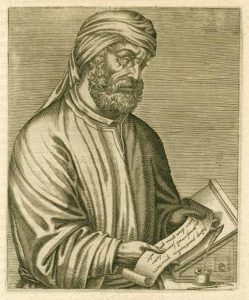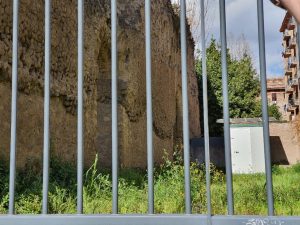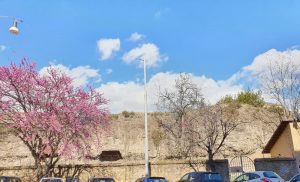Dr Oliver Baldwin is a British Academy Postdoctoral Fellow in the Department of Classics, currently researching internationally for his project Queer Tragedy”. He has kindly provided us with an account of his research trip in various European countries below.
LGBT history month began and ended with me doing precisely LGBT history by roaming European archives for my project Queer Tragedy, a performance history of LGBTQI+ stagings and versions of Greco-Roman tragedy, from 1969, the year of the Stonewall riots in New York, to its fiftieth anniversary in 2019. The objective is to analyse an array of gay Bacchaes, lesbian Oedipuses and trans Medeas that have taken place in several countries at several historical junctures. I use the verb doing because LGBT history involves precisely labour, action and involvement in mapping a constellation that has been darkened, ignored, shunned or dismissed. In archives (gradually specialised but always imperfect) one must construct queer history, reconstruct queer lives and deconstruct normative prejudice. Queer (hi)stories often appear in the periphery of the focus, as blurred images, as distorted echoes, as reflections of phobias, or, contrarily, as direct addresses, looking one straight in the eye claiming: I am here and I am queer. Consequently, the doing in queer history is also a process of being visited by voices and presences, of being haunted, driving you further into the (re/de)construction. The doing of LGBTQI+ history is the work of historians hand in hand with queer (hi)stories.
My European archival doing began in Paris. Queer Tragedy’s archive is a complicated one to construct: often institutions do not have a queer tag in their catalogues for a given performance; many of these performances have taken place in theatres of the off (off) circuit and are therefore unlikely to appear in mainstream (or even in specialised) media; queer issues in these plays are often coded, veiled or even rejected by their own creators. All these issues I faced in France, but at the centre of my labour was the ever-present dictation and conditioning of heteronormativity. This not only influenced the reticence of some theatre makers to have their work described as (fully or partially) LGBTQI+ when I contacted them—a queer play may label a theatre maker as “just queer” and therefore potentially limit their future prospects. It also influenced the very queer portrayals on stage. By chance—an inescapable component of archival work, however rigorous one strives to be—the plays I came across while in France portrayed trans people as essential characters. One may, on the surface, see this as a positive sign. But on closer inspection (and this is my impression), it is rather the opposite. Firstly, none of these trans characters were performed by trans people, but by either cis women or cis men. Secondly, these trans characters are constructed on the normative (and transphobic) understanding of trans people as portents, as beings transiting through maleness and femaleness, as extreme androgyny personified, but never as fully man or woman. One only has to dig into our social (and personal) memories to understand this has been (and continues to be) the norm.
Let me briefly explain with an example. In the staging by Pierre Notte of Stephane Guerin’s Kalashnikov (2013), a disenchanted retelling of Oedipus, we find a character called Le Trans (always referred to as she/her). This character appears as both guide and challenger of the Oedipus-character, mostly on the margins of the action, as if an informed onlooker, an ironic commentator on bourgeois reality. Le Trans stands as a fusion of two ancient personages of mixed identities: the Sphinx, at once woman and lion, and Tiresias, the blind seer who has experienced being both man and woman. In the play, Le Trans is thus a character of special knowledge, mystery and insight precisely for her (allegedly) gender-marginal identity as man-woman, but never fully woman, as the use of transphobic slurs in the play testify–one of which, travesti (a term often used transphobically framing trans people as cross-dressers), is ever-present in describing many other trans characters I have come across. Le Trans, and other trans characters, appear in these plays as sexual/gender portents, as other with para-human insight, as the queerest carrier of knowledge; but never fully woman. The almost impossibility for many in French and Western society of calling a trans-woman a woman and treat her as one is blatant in the cases I have researched so far. Beware of good intentions bearing gifts.
Queer themes in versions of Greco-Roman tragedy do not only reveal the prejudices, phobias and conceptual impossibilities of heteronormativity; they also reveal the resistance, strength and endurance of their queer creators. This is most clearly the case in the performance I researched while in Brussels, the next step after Paris: Jan Ritsema’s Philoktetes-Variations (1994), used different versions of the Philoktetes story to tell (among other issues) of the battle its main actor, Ron Vawter (Philoktetes), was waging against AIDS. The story of the Greek commander abandoned by the Troy-bound Greeks because of his gangrenous snake-bite wound only to then be reclaimed for self-serving interests resounded at a time when AIDS had been ravaging the lives of many gay men for over a decade—men who had also been relinquished, forgotten and repudiated by families and communities. The cries of pain Sophocles wrote to be howled by Philoktetes were now being performed by an internationally-recognised gay actor with HIV, whose nakedness on stage revealed his own Kaposi sarcoma, the wounds caused by snake-like AIDS on the bodies of many. This was central to the whole production and is echoed in the struggles the production team had to face when ensuring the well-being of Ron Vawter: on tour, hotels with a bath and a connected room for a nurse were arranged and contracts specified the potential suspension or the cancellation of the production due to Vawter’s health. AIDS was made even more present by a screening of the film Philadelphia, in which Vawter starred, telling the story of HIV-positive Andrew Becket (played by Tom Hanks), and his legal battle against his employers for discrimination. The screening took place at the same theatre where Philoktetes was being performed, and its revenue was destined for several Belgian AIDS charities. It is difficult to describe how disheartening it is to go through the documents explaining the deterioration of Ron Vawter that contrast with his own adamant intention of making the production happen. Although I knew it was coming, I could not contain myself from shedding more than a tear when reading the note by Kaaitheatre informing the team that Ron Vawter died on his return to New York to prepare the American tour of Philoktetes-Variations. Archival haunting is real and extremely heart-wrenching at times.
 Philotetes-Variations. Kaaitheater. Maarten Vanden Abeele (photographer)
Philotetes-Variations. Kaaitheater. Maarten Vanden Abeele (photographer)
But the queer-tragic stage is also a place for hope as well as of endurance. In Orestes in Mosul (2019), theatre director Milo Rau’s global-collective Oresteia in Gent (where I went to next), the bloody and horrendous family story of the Atreids is told through scenes from the plays (including the Iphigenia story and different versions of Orestes’ matricide), mixing live performances at NTGent and recordings of the production in Mosul (Iraq), alongside reflections, memories and testimonies of the production process and the personal and acting experiences of the Moslawi and European casts. At one point Risto Kübar (playing Orestes) from Estonia and Duraid Abbas Ghaieb (playing Pylades) of Iraqi heritage, tell the audience how they both escaped their homes to find queer refuge in theatre. After this, they both kiss passionately, signifying their union, endurance and hope in the future. They (actors and characters) will kiss twice more, once in the tower from where DAESH executed gay men in Mosul, just after Orestes and Pylades have been put to trial by the chorus. As they kiss, they defiantly and lovingly embrace, resisting the insistent attempts to separate them by the chorus (whose actors had been unsure of the scene during rehearsals). The kiss, in joining the actors’ stories, the loving bond of Orestes and Pylades and the deadly connotations of its location, stood as an act of defiance in building a queer future in which every Orestes and every Pylades can kiss and embrace without their integrity being threatened, echoing Pylades’ line in Euripides’ Orestes: ‘I will take care of you’.
Orestes in Mosul is the play that closes the Queer Tragedy project chronologically, as the receiver of the echoes, hauntings, endurance, celebration, love, hopes and promises of its predecessors, symbolically opened in this performance history by another kiss, that between Dionysus and Pentheus in Richard Schechner’s Dionysus in 69 in New York in 1968. The end of the project appears at the beginning of my LGBTQI+ archival doing, and its beginning towards the end in a few months’ time. But there is never a linear way of doing history, particularly LGBT history, however linear it may later appear in books. I write to you from my hotel room in Berlin, where I arrived after a 9-hour odyssey through the Netherlands and Germany catching three trains and one replacement bus. A good but long victory over storm Eunice. Now in Berlin I find myself jumping chronologically, dramatically and queerly to another kiss, that between Dionysus and Pentheus in Grüber’s Die Bakchen (1974). This ‘highly homoerotic ceremonial’, as a critic described it, will lead me on to other destinations and queer tragedies as I hope it will lead you on to celebrate, vindicate and share LGBT histories beyond this month too. Queer tragic kiss to you all.
Dr Oliver Baldwin (BA/UoR). Queer Tragedy project
 The three authors featured here are ancient African writers: Tertullian, a Berber; Terence, a Libyan; and Apuleius, a Numidian. These authors wrote broadly and across different genres, but each touched on the experiences of their people, even if in a satirical manner.
The three authors featured here are ancient African writers: Tertullian, a Berber; Terence, a Libyan; and Apuleius, a Numidian. These authors wrote broadly and across different genres, but each touched on the experiences of their people, even if in a satirical manner. Throughout history, black and African voices have been silenced systematically to forge a narrative of white supremacy. By casting Western-minority groups as savage or uneducated natives, collective memory now recalls groups of people subdued and modernized by the West. Traditional practices regarding research and interpretation in the Classics discipline tend to reaffirm and strengthen the misconceptions associated with this flawed and dangerous narrative. The field of Classics has been dominated by white, male voices. Through telling stories relatable to them they created an echo chamber of information on the classical world. Perpetuating the idea of a white-washed ancient past is harmful, however, to all. In ignoring data and evidence for a society that was far more influenced by the East and South than was sometimes thought, Westerners have lost or hidden a wealth of knowledge, understanding and answers.
Throughout history, black and African voices have been silenced systematically to forge a narrative of white supremacy. By casting Western-minority groups as savage or uneducated natives, collective memory now recalls groups of people subdued and modernized by the West. Traditional practices regarding research and interpretation in the Classics discipline tend to reaffirm and strengthen the misconceptions associated with this flawed and dangerous narrative. The field of Classics has been dominated by white, male voices. Through telling stories relatable to them they created an echo chamber of information on the classical world. Perpetuating the idea of a white-washed ancient past is harmful, however, to all. In ignoring data and evidence for a society that was far more influenced by the East and South than was sometimes thought, Westerners have lost or hidden a wealth of knowledge, understanding and answers.





















